
Latest Hong Kong coronavirus deaths cause for reflection
- As Hong Kong records its seventh fatality from Covid-19 and numbers escalate in other parts of the world, attention has again been turned to treatment and prevention
Hong Kong has lived a relatively charmed life in the shadow of the coronavirus pandemic, even as it rages elsewhere and global cases top 9 million. Until last weekend, when a 78-year-old woman died, the death toll had stood at four for more than three months and the number of infections had risen only incrementally above 1,000, with long periods without local infections.
Two more deaths have followed, one involving a seriously ill stroke patient.
Imported cases, most recently among returnees from Pakistan, are a reminder that a single misstep in the testing, quarantine and isolation regime could easily undo the early hard work credited with having shielded the city from the worst.
If any evidence is needed to reinforce good reason to be careful it is to be found in the latest market outbreak in Beijing two weeks ago, which has only just been brought under control, according to the deputy director of the Centre for Disease Control and Prevention, Feng Zijian.
Covid-19: Hong Kong urged to test incoming travellers prior to flights
Hong Kong’s low and stable numbers may be considered remarkable for a transport hub so close to the mainland, but a sixth death on Tuesday should serve as a wake-up call. The victim, a man, and the woman who died both lived at Luk Chuen House in Lek Yuen Estate, Sha Tin, the site of an infection cluster which first emerged on May 31.
Since then a 55-year-old stroke victim airlifted from the Philippines has died in hospital of sepsis after testing positive.
The World Health Organisation has warned that the pandemic is accelerating in the United States, South Asia the Middle East and Africa because it is peaking in a number of different countries at the same time. Wishful rationalisation is rampant. The WHO dismisses attempts in some countries, including the US and India, to attribute their increased caseload to more testing, pointing out that more hospital admissions and deaths cannot be explained that way.
With no certainty if and when the virus will fade, attention has turned to treatment and prevention. Predictions that a vaccine will be available by or soon after the new year are persistent but bold, given the exhaustive trials usually involved.
Prospects of a more effective treatment are more positive, with the WHO calling for a rapid increase in the production of the steroid dexamethazone, which has been shown to have life-saving potential for the critically ill.

